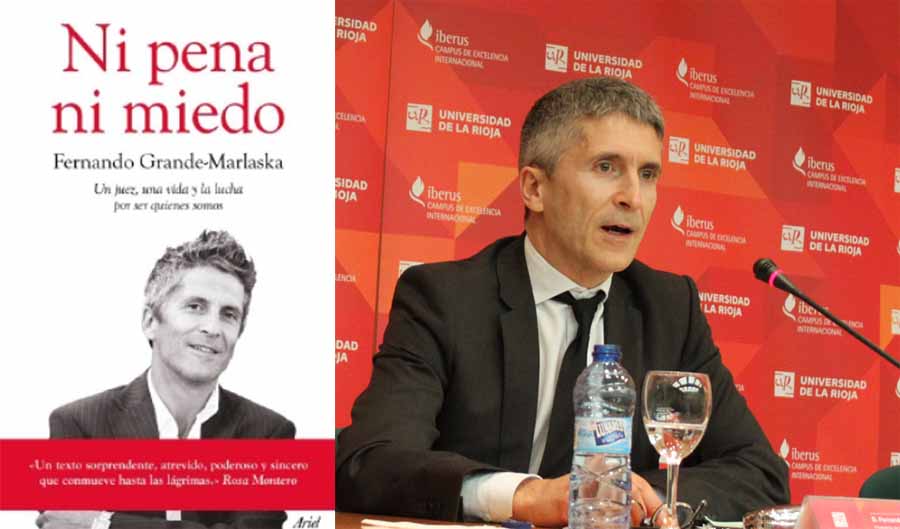guardia civil
En 2004 fue destinado a la Audiencia Nacional como juez sustituto del juez Baltasar Garzón en el Juzgado Central de Instrucción número 5, donde se dio a conocer a nivel nacional, siendo ya conocido como instructor en Bilbao.
Hasta el 30 de junio de 2006, formó parte del Juzgado Central de Instrucción número 5 de la Audiencia Nacional, sustituyendo temporalmente a su titular, el juez Baltasar Garzón. Cuando Garzón se reincorporó a su puesto el 1 de julio de 2006, Grande-Marlaska fue destinado a la Sala de lo Penal de la Audiencia Nacional[2] Se presentó como candidato independiente al Consejo General del Poder Judicial (2006), pero no fue elegido[3][4].
El 30 de agosto de 2007, ordenó la apertura de un juicio oral por injurias a la Corona a varios artistas gráficos. En junio de 2007, decidió archivar la causa contra cuatro directivos de Air Madrid por el presunto fraude cometido durante la crisis que afectó a la aerolínea en diciembre de 2006 y, en septiembre de 2007, rechazó los recursos presentados por la Asociación General de Consumidores y Usuarios y la Organización de Consumidores y Usuarios (OCU) contra el archivo del auto.
president of spain
One of Grande-Marlaska’s entourage emphasizes that he is a cultured man. His favorite writers are all on the list of classics -Voltaire, Dickens, Flaubert- but he highlights Thomas Mann and above all, Marguerite Yourcenar, for her brilliance and for the inquiry she makes through her characters on issues such as love or sexuality.
He cites pride as a trait of his character. Someone in the socialist ranks notes to Vanity Fair that he often «drifts into arrogance». That same source has no qualms in recognizing that some of the resentment he arouses in the PSOE has to do with the fact that Marlaska has been branded as a conservative from more than one front. The origin of this distrust lies in the fact that he opted to be a member of the General Council of the Judiciary with a government of Mariano Rajoy and then accepted to be a minister with one of Pedro Sanchez.
minister of the interior spain
But I liked it. I liked it very much. It was an incredible experience. That’s when I really understood what it was like to be a judge. In those first moments of the career is when you are most eager and you compensate for your lack of experience with enthusiasm, with a kind of recklessness or positive naivety that makes things work out well for you.
What I can tell you is that in my education I have been instilled with a love of effort, I have always given a lot of importance to work, to study, to accomplish things. I do have that. But then I am a messy person
Well, what I am going to say is very hard, but that made the situation not seem normal to me, of course, because it was not, being threatened was something abnormal, but it was certainly not something extraordinary. So when they told me about it
It is bad news, but it is not a trauma either. The question is to adapt it to one’s life, to learn to live with an escort and all those things, it must be difficult. It’s like not knowing how to move, like having to carry crutches when you don’t know how to use them, it’s a mental mess. The first few days you don’t know if you have to go next to them, if you have to talk to them, if you can go your own way and they go behind you.
ceuta
The PNV leader Gorka Agirre, charged by Judge Fernando Grande-Marlaska in the case against the ETA extortion network dismantled last May, has filed a complaint with the General Council of the Judiciary against this magistrate for the leaks of the proceedings. The lawyers of the accused filed the complaint last Monday, understanding that the revelation of the summary proceedings declared secret may constitute several very serious disciplinary offenses.
The text makes a chronological review of the judicial proceedings referred to Gorka Agirre «and the previous leaks that appeared in the media, since the extension of the secrecy of the preliminary proceedings 86/98 was agreed on June 21 last». In addition, it emphasizes that, before the burukide was summoned to testify, «quotations in quotation marks of tapped telephone conversations, transcriptions of wiretaps, photographs of the surveillance or the summons itself had already been published», before the accused had any knowledge of it.

